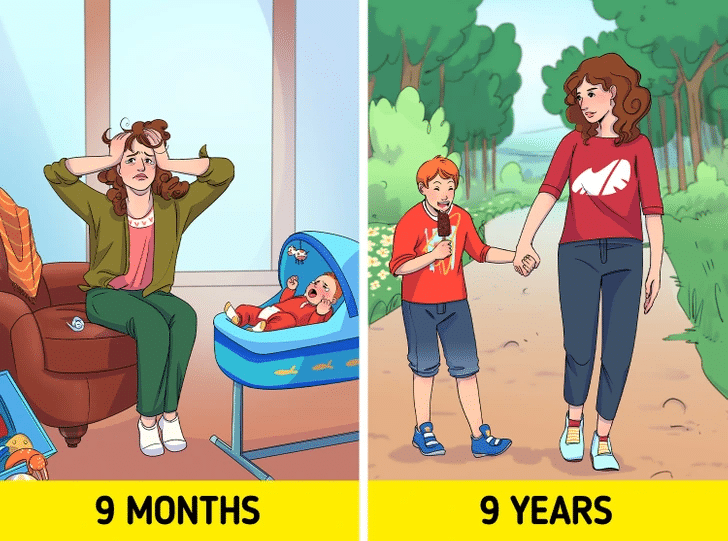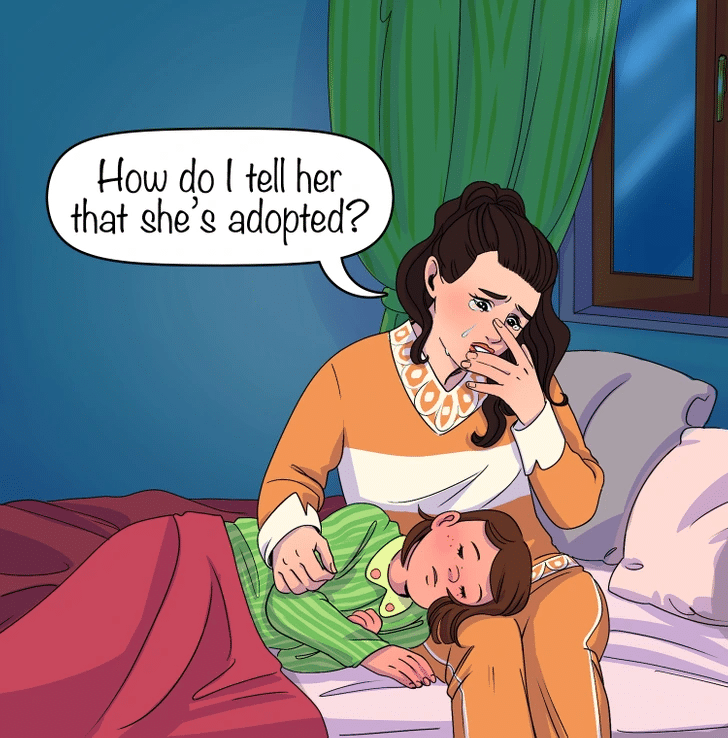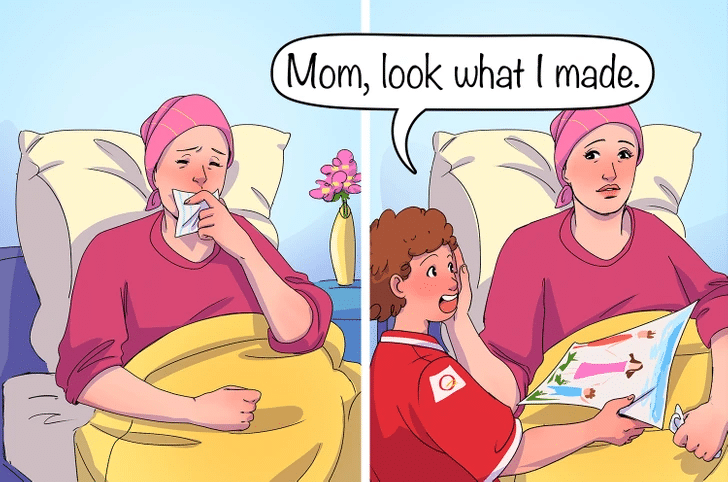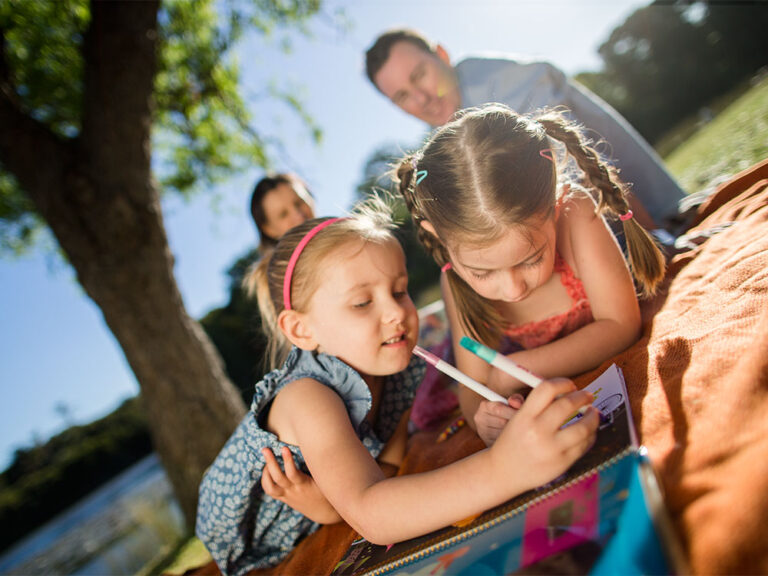A study found that most parents don't like to talk to their kids about money, and many only do it when their kids ask. This might be because parents don't want to make their kids worried. But there are other topics parents also find hard to talk about with their kids, and we'll learn more about them as we go on.
1. Explaining that Santa Clause doesn’t exist

"As my two older children grew older, they began to understand, and I privately explained to them that they were now part of the secret behind Santa's magic. However, my youngest, at the age of 8, had a big emotional moment right after Christmas. They cried and said, 'Just tell me the truth!! I need to know.' So, I did. Interestingly, they also embraced the idea of being part of the team that creates the magic."
"My wife and I haven't revealed the whole truth about Santa to our children. However, we only attribute a few things to him. Our kids are still quite young, but they derive a lot of joy from believing in this magical concept. For them, the wonder and magic are still very real, and I have fond memories of experiencing the same enchantment during my own childhood. We want our kids to have the same experience."
2. That they may be having money problems

"My parents shielded me from their financial situation to prevent me from worrying. In contrast, my husband's parents shared nearly all of their financial details with him. Although this caused stress for him as a child, it ultimately led him to teach me about the importance of money, typical incomes, and more after we finished high school."
It's important to teach young children that money is earned through work and that it's used for things like housing, food, healthcare, and enjoyable things. This can help them develop a basic understanding of finances. I personally became aware at the age of 7 that my parents struggled to cover our mortgage, and this placed a significant burden on me from a very early age.
3. Not having an answer to every question

"When I was around 5 years old, I inquired with my parents about the concept of pi and they admitted not knowing the answer. This motivated me to take on a personal quest of asking them increasingly challenging questions each week. As they struggled to answer many of these questions, I came to the realization that they didn't have all the answers."
"I began to understand this at a relatively young age, perhaps around 9 or 10. I observed my parents becoming frustrated while helping me with basic elementary school homework. It wasn't until I reached the ages of 12 to 14 that I fully grasped the extent of it. During that time, my mom would often ask me questions about topics or subjects she had limited knowledge of."
4. Saying that you can’t be anything you want in life

"I expressed it in a different way. I conveyed to my son that he had the potential to become anything he desired. This was distinct from merely saying he 'can be' anything. I wanted him to recognize that he would have to put in effort and possess the necessary abilities to attain certain goals, but that everything was within his reach."
"I advised my children that with sufficient effort, they could achieve their aspirations. Yet, it's also important to mention that some individuals possess unique talents in areas like art, music, and sports. Therefore, they should explore their interests and passions and then pursue them with dedication."
5. Being terrified while their kids are growing up

"I have a fear that I might not live long enough to witness my children mature into adults. My own father passed away when I was 18, and the men in my family tend to have shorter lifespans. I yearn to engage in meaningful conversations with them, witness their college graduations, and see them find their life partners. The uncertainty of not being able to experience these moments terrifies me."
"My greatest fear is that a child might be involved in an accident that leaves them with a permanent disability, making them dependent on me for the rest of their life. I've witnessed the immense dedication and effort it takes to care for someone in such circumstances, and I'm uncertain about my ability to cope with those challenges."
6. That they didn’t really like you as an infant

"I didn't feel a strong connection to either of them until they reached about 2 years old. While they were cute and adorable as babies, I've never been particularly fond of infants. Of course, they'll never be aware of this because it might sound harsh to say, 'You were quite challenging during that time.'"
"My father was similar in this regard. He's an amazing person, but he didn't know what to do with very young children, almost like he was thinking, 'What am I supposed to do with this little thing?' It's funny because he didn't marry a woman with six kids, all under the age of nine, and then have five more with her… Oh, wait…"
7. Revealing you were adopted

"Right from the moment we adopted our children, we initiated discussions about adoption. Why? Because the earlier you begin, the more at ease you become with the conversation and the associated terms. When my older daughter was just a baby, I used to say, 'We are incredibly happy we adopted you. You are the greatest blessing in our lives.'"
"When our daughters were young, we read numerous children's books about adoption and encouraged them to become at ease with their own stories. Throughout the years, we addressed their questions as they arose, providing straightforward answers at each developmental stage. I believe that honesty is the best policy, as lies, partial truths, and secrets within the family can lead to distrust, sorrow, and resentment."
8. Hiding their health problems from you

"Their primary concern is not to frighten their children, as the most typical emotion a young person experiences when they're informed of the potential loss of a parent is fear. Children aren't preoccupied with concerns about hospital bills, funeral arrangements, or guardianship, as an adult might be. Their emotions are primarily centered on fear and sadness."
I have a vivid memory of feeling absolutely crushed when I was 16 and learned that my grandmother wouldn't make it after suffering a stroke. I was utterly at a loss on how to cope with the situation. I also carried a sense of guilt for avoiding visits to her in the hospital; I just couldn't bear to see her in that condition. It makes me wonder about the impact on a younger child if it were their mother or father in a similar situation."



